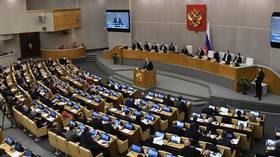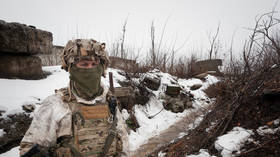Russian parliament urges Putin to recognize Donbass

Lawmakers in the Russian State Duma have backed a motion calling on the Kremlin to recognize the independence of the breakaway Donetsk and Lugansk regions in eastern Ukraine, with the overwhelming majority voting in support of the draft resolution amid heightened tensions between Moscow and Kiev.
On Tuesday, 351 MPs backed the draft proposal, originally introduced by the Communist Party, which is addressed directly to the head of state. Meanwhile, 16 legislators opposed the move and one abstained.
Following the vote on the resolution, Duma Chairman Vyacheslav Volodin said that the provision “will be signed immediately” and sent to Russian President Vladimir Putin for feedback.
According to one of the lawmakers behind the decision, Russians would be prepared to feel the pinch of sanctions as a result of recognizing the two Donbass regions, sacrificing the traditional end-of-year bonus paid by many firms. “I am sure that the people of Russia today fully support our decree and are ready to give up more than just their 13th salary payment,” Kazbek Taisaev claimed.
Ukrainian Foreign Minister Dmitry Kuleba warned on the same day at a briefing that Kiev would consider the vote to recognize the two self-proclaimed people’s republics as Moscow’s abandonment from a major peace plan that seeks to put an end to the conflict in the war-torn Donbass.
“If a decision is made…Russia will de facto and de jure withdraw from the Minsk agreements with all the accompanying consequences,” the top diplomat warned.
Volodin said on Monday that the two republics' recognition “is an extremely important and high-stakes issue,” adding that “Washington is inflaming tensions and supplying weapons to Ukraine together with European countries, while Kiev continues to disregard the Minsk accords.”
The two Minsk agreements were signed in 2014 and 2015 by Kiev, Moscow, the leaders of the two breakaway regions, and the intergovernmental organization OSCE. Aside from a ceasefire, the treaties also included an agreement for constitutional reform in Ukraine, with decentralization and extra powers for the Donetsk and Lugansk republics. However, this is yet to be implemented.
In mid-January, lawmakers from the Communist Party submitted a draft resolution proposing a formal appeal to Putin “on the need to recognize the Donetsk People’s Republic and the Lugansk People’s Republic.”
The deputies said that recognizing the self-proclaimed republics would set the framework for ensuring guarantees and protecting the population, of which ethnic Russians form the largest minority, from external threats.
Donetsk and Lugansk declared their autonomy from Kiev in 2014 following the events of the Maidan, when Ukraine’s elected government was ousted as a result of violent street protests. However, neither Russia nor Ukraine currently recognize their independence, and both are signatories to the Minsk agreements, which call for a diplomatic resolution to put an end to the conflict that has waged on for eight years.
The appeal for the formal recognition of the regions in southeastern Ukraine comes amid heightened tensions on the Russian-Ukrainian border in recent weeks. Kiev has argued that the Donbass separatists are Russian proxies, which the Kremlin denies, and has criticized Moscow’s issuing of over half a million passports to citizens living there.














